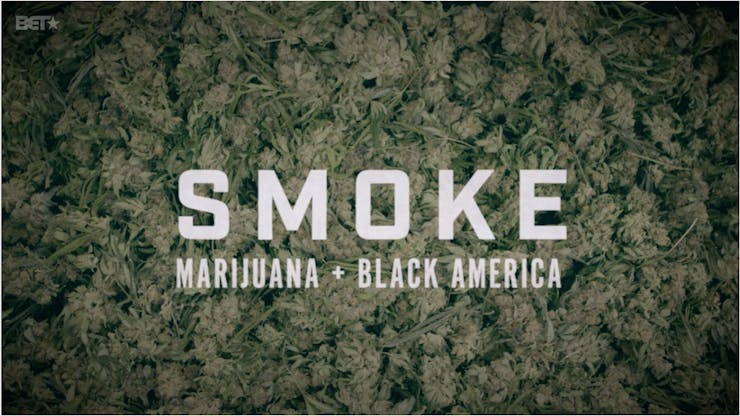There have been plenty of documentaries on the War on Drugs, and the way it has destroyed Black and Brown communities. We’ve got Grass Is Greener on Netflix; Brett Harvey’s Culture High; and there’s Kevin Booth’s American Drug War 1 and 2, just to name a few.
While they’ve all been instrumental in educating people on the history of weed culture and prohibition, BET’s SMOKE: Marijuana + Black America, executive produced and narrated by Nasir Jones, hits a little different.

(Image courtesy of BET)
Why? Because marijuana in America is no longer just a political issue; it’s financial, it’s industrial; and the average citizen has absolutely no clue why all of these dispensaries and CBD shops you see popping up on every street corner isn’t exactly a sign of change.
Through highlighting the reality that exponentially more people have been imprisoned during the Bush Sr., Clinton, Bush Jr., and Obama administrations, and despite the Cole Memorandum passing under Barack, SMOKE showcases that the future of cannabis is still a horror story in a country that just had four new states (New Jersey, Montana, Arizona, and South Dakota) legalize adult-use cannabis.
The overall message from SMOKE: Marijuana + Black America
If you knew absolutely nothing about legal weed, you could walk away from the SMOKE documentary understanding enough about cannabis history, culture, media, business, and politics to see how, in 2020, the government is still using weed to oppress our people – effectively blocking us out of an industry that is expected to reach a $30 billion dollar worth by 2025.
The data shown in this documentary explicitly highlights multiple problems including, but not limited to:
- Only 6 of the 200 (3%) cannabis businesses in Los Angeles are Black-owned;
- Barbara Lee, California Congresswoman, stating that less than 1% of the licenses in the trillion-dollar business go to African Americans and Latinos;
- Al Harrington stating that Black people represent less than 4% of the global cannabis industry when 85% of all drug arrests in Black communities are cannabis-related.
“The industry was created on our backs because we never gave up. We kept putting our freedom at risk to get the opportunity that is now being taken advantage of by people that don’t look like us. We have a problem with that.”
Al Harrington, founder of Viola
The overall message from SMOKE is that every single American needs to care about and fight against legalization without social equity and community restoration. That all prisoners like Corvain Cooper, who is effectively serving a life sentence with no parole date for a non-violent marijuana crime, should be freed immediately.

(Image courtesy of BET’s SMOKE)
Additionally, states should not be moving forward with legalization until there are government programs in place to even the playing field between venture capitalists and culture vultures like John Boehner (former anti-cannabis politician turned current cannabis investor) and industry pioneers.
What BET’s SMOKE suggests about the future of weed
What sets SMOKE apart from other documentaries is the people it profiles. Instead of focusing on the historic figures in culture like Cheech and Chong, Snoop Dogg, and Willie Nelson; SMOKE puts real faces to the business and politics of legal cannabis in America.
SMOKE showcases Wanda James and Scott Durah, owners of Colorado’s SimplyPure, and the first-ever African Americans to be licensed to legally sell cannabis. Also businessmen Virgil Grant, CEO of Southern California Coalition, who went from the streets to the boardroom. It shows Berner, the face of Cookies, a formerly garage-based operation turned empire that absolutely dominates cannabis genetics and culture.
With these glimpses behind the curtains of fame, people can now see what the American Dream of cannabis looks like for Black and Brown people.
– Dante Jordan
SMOKE highlights that many key figures in cannabis today are anomalies, when they should be signs of a country atoning for its history. It helps the audience think ahead to what the future of cannabis legalization may look like – and why legalization across the US is being examined so closely.
If restorative justice isn’t emphasized and implemented, Black and Brown people will be completely outcast from what is sure to become one of, if not the single biggest, industries that Earth will ever see. We can’t accept that.





